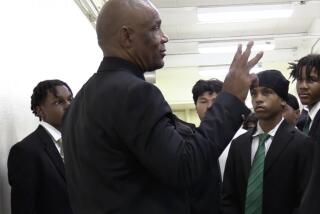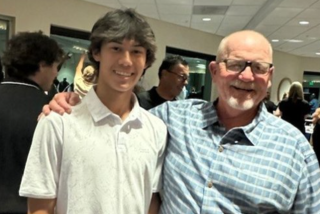These coaches stay in the game
John McKissick is in his 60th season coaching the Summerville (S.C.) High School football team.
No head football coach has held the same post longer. None on any level has ever won more games (589).
But McKissick, who turns 85 this month, never thinks about retirement, because of what that might bring.
“Most all of my buddies my age that retired, they all passed away,” McKissick says in a smooth, genteel Southern drawl. “I’m not ready yet. I’ve got four great-grandchildren and I want to see what’s going to happen to them.”
It can be difficult for anyone to let go of a career, but coaches are a different breed.
“It’s difficult for them because it becomes their purpose in life,” said Greg Dale, a professor of sports psychology and sports ethics at Duke University. “It’s their identity.”
Coaching offers an all-consuming, endlessly demanding position of influence, power and prestige, and many — we’ve come to know them as “coaches for life” — hang on as long as possible, no matter what.
The same week McKissick began his 60th campaign, another Hall of Famer, Tennessee women’s basketball Coach Pat Summitt, vowed to continue to her 38th season in Knoxville despite learning she has a debilitating brain disease.
Summitt, 59, said that despite having early-onset dementia of the Alzheimer’s type, she wants to coach the Lady Vols “as long as the good Lord is willing.”
Dale, who works with the Blue Devils’ coaches and athletes, said that though Summitt has the support of the Tennessee chancellor and athletic director, if she isn’t well enough to coach, will anyone there have the courage to speak up?
“It’s really going to be key for her to have some people around her she trusts that can be honest with her,” Dale said.
In any field, there’s a line between being able to perform and not being up to the task, whether it’s physical or mental.
And Summitt isn’t the first longtime coach whose stature allowed that boundary to be pushed.
Hall of Famer Joe Paterno, 84, has coached Penn State football since 1966, and in recent years has sustained two injuries, including a broken leg, when players crashed into him.
But Paterno said at Big Ten media day this year he believes he can coach four or five more years.
The intricacies of coaching can make it difficult to walk away, as Vince Lombardi, arguably football’s greatest coach, proved in 1969.
That year, Lombardi ended up back on the sidelines with the Washington Redskins after he retired following consecutive Super Bowl championships in 1967 and ’68 with the Green Bay Packers.
“He missed associating with the players, the give-and-take of being in the locker room with the guys,” says his son, Vince Lombardi Jr.
Lombardi would die a year later, at 57, from cancer.
Given how long some stay in the game — legendary football coach Amos Alonzo Stagg kept at it until he was 90 — death may in fact be the only end to some coaches’ careers.
But coaching also seems to be what can stave off death.
Alabama football coach Paul “Bear” Bryant famously said he’d “probably croak in a week if I ever quit coaching.” His estimate was close. At 69, he died four weeks after coaching his final game in 1983.
But coaching doesn’t have to end when the career does.
Ed Cerny, a longtime football coach in South Carolina who wrote the book “Old Coaches Never Die, They Just Run Out of Timeouts,” said coaches can still find purpose off the field, as in the way UCLA’s John Wooden mentored countless people after he retired until his death at 99.
“That’s the very best example for a coach being able to do it long after,” said Cerny, 64.
For McKissick, who began coaching the Green Wave in 1952 at 25 and has won 10 state championships and 26 regional titles, and enjoyed 57 winning seasons, the “long after” is the troublesome part.
“Well, there can’t be anything I can do next except die,” he says. “I’m too old.”
McKissick’s closest friend, Jerry Nettles, who played quarterback for him in the 1950s, says McKissick does enjoy walking on the beach but he has no hobbies: doesn’t fish, doesn’t golf, nothing.
“He’ll never retire without a reason,” Nettles says.
Right now, he doesn’t have one. And like Paterno, who has invited him to Happy Valley, McKissick hasn’t slowed.
“We run a tight ship here,” he says. “I don’t allow earrings. I don’t allow long hair. I’ve had a few [of my 3,000] players challenge that. I tell ‘em, football is a privilege, not a right.”
On the field, he says he coaches his assistant coaches — there are 10 on the varsity staff — more than he really coaches the players, which is true of many longtime head coaches.
“All my coaches except two played for me, so they know what I want,” he says.
During practices, he rides a golf cart to give instructions — not that he needs to, but it’s quicker that way.
McKissick, who lives with Joan, his wife of 59 years, says that he’s in good shape and that the pacemaker installed in 2005 was done at the advice of a cardiologist, who called it insurance.
“As long as they want me to work and I’m healthy,” he says, “I’ll keep doing it.”
Nettles says McKissick will “die on the sideline,” and that’s what many in Summerville, population 43,000, have said for years.
“Well, the joke around town is they’re going to put one of them big front-end loaders on the sideline,” McKissick says, laughing, “and when I die, they’re going to push me in it and go on with the game.”
twitter.com/baxterholmes
More to Read
Go beyond the scoreboard
Get the latest on L.A.'s teams in the daily Sports Report newsletter.
You may occasionally receive promotional content from the Los Angeles Times.










